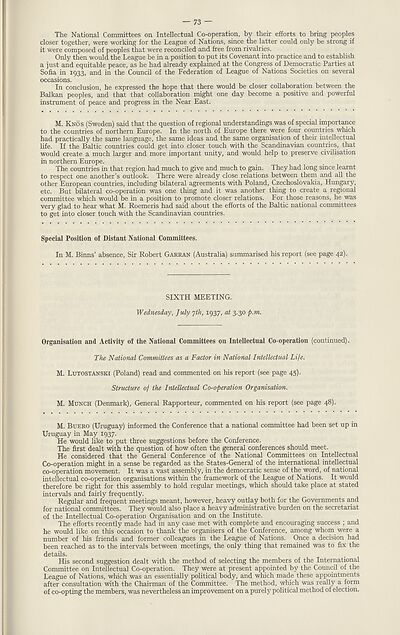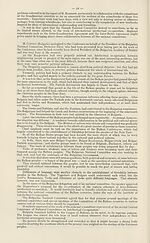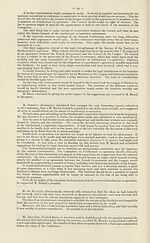International > Proceedings of the second General conference of national committees on intellectual co-operation, Paris, July 5th-9th, 1937
(75)
Download files
Complete book:
Individual page:
Thumbnail gallery: Grid view | List view

— 73 —
The National Committees on Intellectual Co-operation, by their efforts to bring peoples
closer together, were working for the League of Nations, since the latter could only be strong if
it were composed of peoples that were reconciled and free from rivalries.
Only then would the League be in a position to put its Covenant into practice and to establish
a just and equitable peace, as he had already explained at the Congress of Democratic Parties at
Sofia in 1933, and in the Council of the Federation of League of Nations Societies on several
occasions.
In conclusion, he expressed the hope that there would be closer collaboration between the
Balkan peoples, and that that collaboration might one day become a positive and powerful
instrument of peace and progress in the Near East.
M. Knos (Sweden) said that the question of regional understandings was of special importance
to the countries of northern Europe. In the north of Europe there were four countries which
had practically the same language, the same ideas and the same organisation of their intellectual
life. If the Baltic countries could get into closer touch with the Scandinavian countries, that
would create a much larger and more important unity, and would help to preserve civilisation
in northern Europe.
The countries in that region had much to give and much to gain. They had long since learnt
to respect one another’s outlook. There were already close relations between them and all the
other European countries, including bilateral agreements with Poland, Czechoslovakia, Hungary,
etc. But bilateral co-operation was one thing and it was another thing to create a regional
committee which would be in a position to promote closer relations. For those reasons, he was
very glad to hear what M. Roemeris had said about the efforts of the Baltic national committees
to get into closer touch with the Scandinavian countries.
Special Position of Distant National Committees.
In M. Binns’ absence, Sir Robert Garran (Australia) summarised his report (see page 42).
SIXTH MEETING.
Wednesday, July yth, 1937, at 3.30 p.m.
Organisation and Activity of the National Committees on Intellectual Co-operation (continued).
The National Committees as a Factor in National Intellectual Life.
M. Lutostanski (Poland) read and commented on his report (see page 45).
Structure of the Intellectual Co-operation Organisation.
M. Munch (Denmark), General Rapporteur, commented on his report (see page 48).
M. Buero (Uruguay) informed the Conference that a national committee had been set up in
Uruguay in May 1937.
He would like to put three suggestions before the Conference.
The first dealt with the question of how often the general conferences should meet.
He considered that the General Conference of the National Committees on Intellectual
Co-operation might in a sense be regarded as the States-General of the international intellectual
co-operation movement. It was a vast assembly, in the democratic sense of the word, of national
intellectual co-operation organisations within the framework of the League of Nations. It would
therefore be right for this assembly to hold regular meetings, which should take place at stated
intervals and fairly frequently.
Regular and frequent meetings meant, however, heavy outlay both for the Governments and
for national committees. They would also place a heavy administrative burden on the secretariat
of the Intellectual Co-operation Organisation and on the Institute.
The efforts recently made had in any case met with complete and encouraging success ; and
he would like on this occasion to thank the organisers of the Conference, among whom were a
number of his friends and former colleagues in the League of Nations. Once a decision had
been reached as to the intervals between meetings, the only thing that remained was to fix the
details.
His second suggestion dealt with the method of selecting the members of the International
Committee on Intellectual Co-operation. They were at present appointed by the Council of the
League of Nations, which was an essentially political body, and which made these appointments
after consultation with the Chairman of the Committee. The method, which was really a form
of co-opting the members, was nevertheless an improvement on a purely political method of election.
The National Committees on Intellectual Co-operation, by their efforts to bring peoples
closer together, were working for the League of Nations, since the latter could only be strong if
it were composed of peoples that were reconciled and free from rivalries.
Only then would the League be in a position to put its Covenant into practice and to establish
a just and equitable peace, as he had already explained at the Congress of Democratic Parties at
Sofia in 1933, and in the Council of the Federation of League of Nations Societies on several
occasions.
In conclusion, he expressed the hope that there would be closer collaboration between the
Balkan peoples, and that that collaboration might one day become a positive and powerful
instrument of peace and progress in the Near East.
M. Knos (Sweden) said that the question of regional understandings was of special importance
to the countries of northern Europe. In the north of Europe there were four countries which
had practically the same language, the same ideas and the same organisation of their intellectual
life. If the Baltic countries could get into closer touch with the Scandinavian countries, that
would create a much larger and more important unity, and would help to preserve civilisation
in northern Europe.
The countries in that region had much to give and much to gain. They had long since learnt
to respect one another’s outlook. There were already close relations between them and all the
other European countries, including bilateral agreements with Poland, Czechoslovakia, Hungary,
etc. But bilateral co-operation was one thing and it was another thing to create a regional
committee which would be in a position to promote closer relations. For those reasons, he was
very glad to hear what M. Roemeris had said about the efforts of the Baltic national committees
to get into closer touch with the Scandinavian countries.
Special Position of Distant National Committees.
In M. Binns’ absence, Sir Robert Garran (Australia) summarised his report (see page 42).
SIXTH MEETING.
Wednesday, July yth, 1937, at 3.30 p.m.
Organisation and Activity of the National Committees on Intellectual Co-operation (continued).
The National Committees as a Factor in National Intellectual Life.
M. Lutostanski (Poland) read and commented on his report (see page 45).
Structure of the Intellectual Co-operation Organisation.
M. Munch (Denmark), General Rapporteur, commented on his report (see page 48).
M. Buero (Uruguay) informed the Conference that a national committee had been set up in
Uruguay in May 1937.
He would like to put three suggestions before the Conference.
The first dealt with the question of how often the general conferences should meet.
He considered that the General Conference of the National Committees on Intellectual
Co-operation might in a sense be regarded as the States-General of the international intellectual
co-operation movement. It was a vast assembly, in the democratic sense of the word, of national
intellectual co-operation organisations within the framework of the League of Nations. It would
therefore be right for this assembly to hold regular meetings, which should take place at stated
intervals and fairly frequently.
Regular and frequent meetings meant, however, heavy outlay both for the Governments and
for national committees. They would also place a heavy administrative burden on the secretariat
of the Intellectual Co-operation Organisation and on the Institute.
The efforts recently made had in any case met with complete and encouraging success ; and
he would like on this occasion to thank the organisers of the Conference, among whom were a
number of his friends and former colleagues in the League of Nations. Once a decision had
been reached as to the intervals between meetings, the only thing that remained was to fix the
details.
His second suggestion dealt with the method of selecting the members of the International
Committee on Intellectual Co-operation. They were at present appointed by the Council of the
League of Nations, which was an essentially political body, and which made these appointments
after consultation with the Chairman of the Committee. The method, which was really a form
of co-opting the members, was nevertheless an improvement on a purely political method of election.
Set display mode to:
![]() Universal Viewer |
Universal Viewer | ![]() Mirador |
Large image | Transcription
Mirador |
Large image | Transcription
Images and transcriptions on this page, including medium image downloads, may be used under the Creative Commons Attribution 4.0 International Licence unless otherwise stated. ![]()
| League of Nations > International > Proceedings of the second General conference of national committees on intellectual co-operation, Paris, July 5th-9th, 1937 > (75) |
|---|
| Permanent URL | https://digital.nls.uk/195218150 |
|---|
| Shelfmark | LN.XII |
|---|
| Description | Over 1,200 documents from the non-political organs of the League of Nations that dealt with health, disarmament, economic and financial matters for the duration of the League (1919-1945). Also online are statistical bulletins, essential facts, and an overview of the League by the first Secretary General, Sir Eric Drummond. These items are part of the Official Publications collection at the National Library of Scotland. |
|---|---|
| Additional NLS resources: |
|

